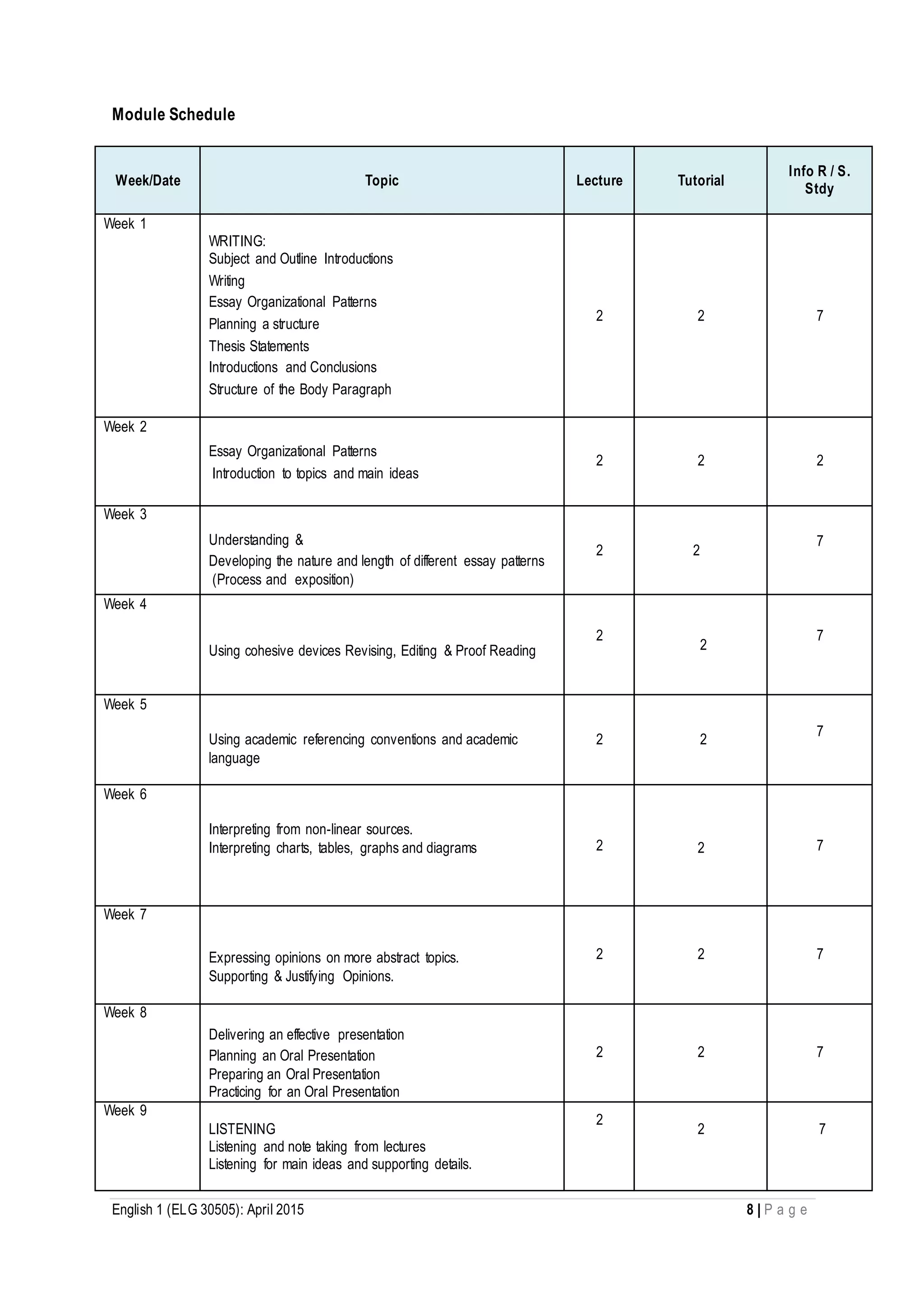This document provides information about an English language module for students at Taylor's University. It summarizes the module synopsis, teaching objectives, learning outcomes, modes of delivery, and types of assessment. The module focuses on developing academic writing, reading, listening, and speaking skills to prepare students for university-level English proficiency. It will be delivered through lectures, tutorials, and self-study over 18 weeks. Students will be assessed through formative and summative assessments, including essays, presentations, and exams. The goal is for students to improve their English communication abilities and be able to analyze various texts and conversations.
![English 1 (ELG 30505): April 2015 1 | P a g e
SCHOOL OF ARCHITECTURE, BUILDING & DESIGN
Centre for Modern Architecture Studies in Southeast Asia (MASSA)
_________________________________________________________________________________________
Foundation in Natural and Built Environments
Module:ENGLISH1[ELG 30505]
Prerequisite:None
CreditHours:5
Instructor:CassandraRashikaWijesuria(CassandraRashika.Wijesuria@taylors.edu.my)
Module Synopsis
English1 preparesstudents for tertiary studies. Themodule providesinstructionandpracticein,andassessment
of, English language skills and the discipline required for such study. This module focuses on development of
academic writing skills which includes the basic 5-paragraph essay writing for expository essays as well as
interpreting non-linear text. On the other hand, the reading skills will center on the analyses of contemporary
essay and reading texts. The other two skills which are covered in this course are listening and speaking skills.
Theseskillswill be introduced to the students byproviding them with listening tasks from talks and lectures and
basic oral presentation skills which will prepare them to converse more appropriately. At the end of the session,
they should be able to demonstrate English Language proficiencyat both pre-universityand tertiarylevel.
Module Teaching Objectives
The teaching objectives of the module are:
1. Todevelopbasic 5-paragraphessaywriting.
2. Tointroducebasic referencingskills.
3. Tointroduceandemphasizeonthe importanceofanalyticalskillsfor contemporaryessays and reading
texts.
4. Tohighlighttheimportanceoflisteningandoralpresentationskillsand practiceininterpretingnon-linear
text.
Module Learning Outcomes
Uponsuccessfulcompletionofthe module,studentswillbeable to:
1. Produceawell-developedandwell-organised5-paragraphexpositoryessay.
2. Apply correctAPA style referencingtechniques.
3. Analyse contemporaryessays andreadingtexts critically.
4. Analyse diagrams/chartsandextractrelevant information.
5. Analyse and listento conversationsin various interactive,social,professionalandacademicsituations.
6. Identify the mainideaandgist from lecturesandtalks.
7. Produceaneffective presentationby applyingthe elementsof aneffective speaker.
Modes of Delivery
Thisisa 5 credithourmoduleconducted over a period of 18 weeks. The modes of deliverywill be in the form of
lectures, tutorials, and self-directed study. The breakdown of the contact hours for the module is as follows:
Lecture: 2 hours per week
Tutorial: 2 hours per week
Self-directed study: 7 hours per week](https://image.slidesharecdn.com/english1courseoutline-150807142210-lva1-app6892/75/English-1-course-outline-1-2048.jpg)








